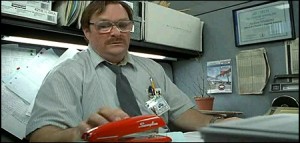Wherein the author suggests people stop complaining about their jobs and be the change.
Tons of Facebook people complain about their jobs. It makes me feel a little guilty because I love my job. OK, it doesn’t, really. But I’ve been in that place before and learned the problem was more me than the job.
Mood music:
[spotify:track:7E8QnPXVk1Sw9Gi06ENZ0i]
There are days where I find it a bit unreal that I have the job I’m in now. I get up in the morning itching to go. I enjoy the company of my co-workers. Given where I’ve been, it’s a little bit strange.
I am fortunate to work for a company with a warm, family-like culture. But I’ve worked for companies like that before and I was miserable. One of my favorite bosses ever had the pleasure of working with me at a time where my demons were ripping me to shreds.
I’ve worked for companies that weren’t like that, too.
All I know is this: Some of my most miserable working days were the result of the ghosts in my head. At the time, I confused those ghosts with the people around me. To be fair to myself, some people were miserable to work for and with, but when you’re slowly having an emotional breakdown every personality tick you come across is exaggerated times 20.
Ever since learning to manage the OCD raging inside of me as well as the related addictions, the same personality ticks don’t hit me that way. Sometimes I’m amused. Most of the time I’m sympathetic or empathetic. How could I not identify?
Still, there are times when I see the whining people do and in a self-impressed haze I forget how I used to be.
One person doesn’t like a teaching gig. Someone else is unhappy with their IT job.
Sorry to hear about it.
I cringe when someone gripes about their job on Facebook, but only because I can’t help but picture their bosses seeing those comments and frothing at the mouth.
Some people even name their boss, or a bigger boss they don’t often see but hate all the same.
Sorry, my friends, but that’s a stupid thing to do. Seriously.
Of course, I’m the last one to tell you how you should behave. But I have learned a few things worth sharing:
–For some people — and this was the case for me when I worked at TechTarget/SearchSecurity –there’s the hope that all will be right with the world if you get out of a job you hate and into something else. I was so desperate to leave The Eagle-Tribune that I would have taken a gig as a trash truck driver if it were available. At one point I seriously considered applying for postal work. TechTarget by comparison was a far better job for me. But I was so messed up inside that I couldn’t enjoy it for the first two years.
–When the change happened inside of me, I think my overall approach to work changed. Had I gone through it while still at The Eagle-Tribune, I might still be working there. I probably would have been happier there simply as the result of getting a grip on my demons. That said, I’m glad things unfolded as they did.
Sometimes it’s not the job that’s the problem. Sometimes it’s just the employee’s state of mind.


